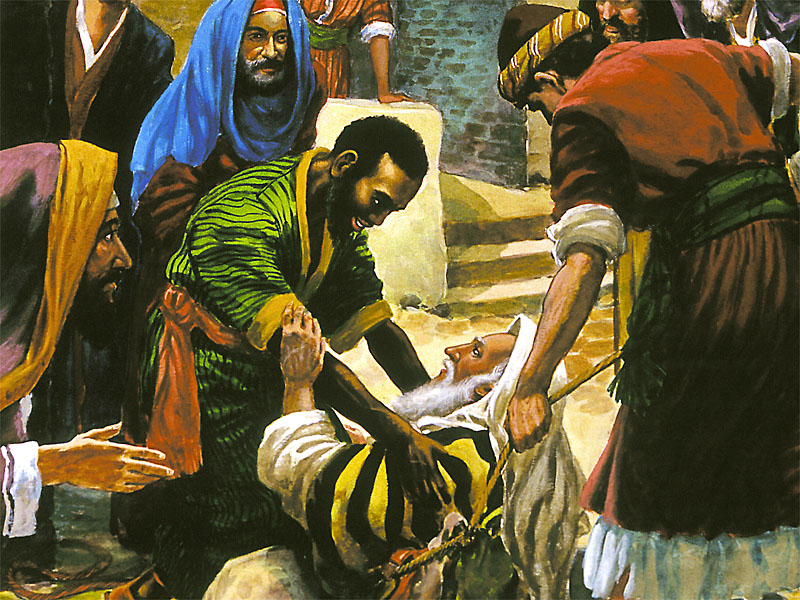If you missed Part 1, see it here.
6. Local Outreach
“As we have therefore opportunity, let us do good unto all men, especially unto them who are of the household of faith.” (Galatians 6:10)
One main focus of our family is ministering to the needs of those around us, especially our brothers and sisters in Christ. This may mean cooking and delivering a meal for a widow, making cards for someone in the hospital or nursing home, extending hospitality to friends from church, or filling a box of groceries for a family who is going through a hard time. Dad and Mom regularly involve us children in outreach.
They have taught us that those in our area of Maine are just as important to God and just as much in need of Christ as are those in Africa, Asia, or anywhere else in the world. God has called us to be a light, a testimony, and a blessing right where He has placed us. Especially since I finished my formal homeschooling and so have more flexibility with my schedule, Dad and Mom have encouraged me to be alert to the needs around me and to seek God as to how He would use me to help meet them.
7. Separation from the World
“Who shall ascend into the hill of the LORD? or who shall stand in his holy place? He that hath clean hands, and a pure heart; who hath not lifted up his soul unto vanity, nor sworn deceitfully. He shall receive the blessing from the LORD, and righteousness from the God of his salvation.” (Psalm 24:3-5)
We serve the LORD, who commands us, “Be ye holy; for I am holy” (I Peter 1:16b). The culture around us is the opposite of holy—it is largely profane, vile, unclean, and dangerous. If we truly want to follow Christ, we cannot live the way everyone else is living.
We must be separate, pure, peculiar. We must hold everything up against God’s pure Word and make that our touchstone and guide in all areas, including: Where will our family attend church? What should we focus on in our homeschool? What types of clothing will we wear? What styles of music will we listen to? In what activities will we be involved? How will we use the television and the computer? How will the children get to know their future spouses? What types of higher education are Biblical and worthwhile?
Most of my peers have grown up through government schools and have been taught to think according to a Marxist, humanistic, atheistic worldview. They have been taught that, to be good citizens, they must blindly obey the government and be “tolerant” of anything except Biblical Christianity. We must be different, for we have been ransomed. Christ “gave himself for us, that he might redeem us from all iniquity, and purify unto himself a peculiar people, zealous of good works” (Titus 2:14).
8. Sheltering
“I am as a wonder unto many; but thou art my strong refuge. Let my mouth be filled with thy praise and with thy honour all the day.” (Psalm 71:7-8)
Many people look down on parents who shelter their children. I don’t. I grew up as a sheltered child, and I am so thankful my parents chose and worked to do this for me. We live in a wicked world, full of sin, sorrow, death, hatred, crime, and suffering. But my parents worked hard to protect me from bad language, lustful or violent images and media, salacious accounts of cultural wrongs, discussions of certain modern social issues, and graphic accounts of suffering and death. By God’s grace, they allowed me an innocent childhood.
When a baby is born prematurely, it often does not have as good health as a child who is in the protection of the womb for the full nine months. God designed for infants to be sheltered for this time for their benefit, as they are still developing. Parents really have no say over whether a baby will arrive before, on, or after the due date, but parents do have a say over when their children will be exposed to certain types of knowledge.
If children are exposed prematurely to the evils of the world, it can result in fear and impure thoughts. If the exposure is habitual, it can produce callousness to sin and to human suffering. God shelters us as His children, and I believe it is the duty of parents to shelter their sons and daughters as they develop physically, mentally, and spiritually.
9. Excellent Books
“Finally, brethren, whatsoever things are true, whatsoever things are honest, whatsoever things are just, whatsoever things are pure, whatsoever things are lovely, whatsoever things are of good report; if there be any virtue, and if there be any praise, think on these things.” (Philippians 4:8)
Our family loves books. Biographies, poetry, picture books, encyclopedias, ASL manuals, cookbooks, homeschool magazines, science and nature books and magazines, music books, Bible commentaries and references, carefully selected fiction, allegories, dictionaries, photo albums, family albums, and the Scriptures…we love to fill our minds with knowledge and wisdom.
There are many books available today, but only a limited number of them are worthwhile. Therefore, we must be discerning. Some are excellent and will edify us and our families, but some are either subtly or openly detrimental to our spiritual walks and our family relationships. The latter must be vigilantly avoided. It is better to have a few quality books that have been screened for wholesomeness than to have a huge library full of drivel or danger. My parents have read a variety of material aloud to us through the years, and they have also screened books for us to read ourselves. Good books nourish the mind and soul and help us “grow in grace, and in the knowledge of our Lord and Savior Jesus Christ” (II Peter 3:18).
10. Sound Speech and Communication
“Let your speech be alway with grace, seasoned with salt, that ye may know how ye ought to answer every man.” (Colossians 4:6)
My parents have emphasized the importance of excellent communication. Most of all, it is vital that we and our children be able to read and understand the Word of God. And secondly, we must be able to share it with others, both in conversation and in writing. The multitudes who listened to Jesus were astonished at the graciousness and authority of His words.
James 3 describes the dangerous power of the tongue. Lies, gossip, blasphemy, idle words, coarse language, quarreling, disrespectful speech, whining, complaining, worldly songs, hurtful or angry words—all these are uses for the tongue that have hurt people’s souls since the beginning of time. But none of these are ways our Creator intended for us to communicate.
A soft answer, discretion, sound speech, praise, thanksgiving, encouraging words, the teaching of God’s principles, comfort, songs that honor God, the reading and recitation of Scripture, Biblical rebuke, exhortation, evangelism— all these are good and acceptable ways to employ our tongues, ones that will bless us and those who hear us.
God wants to help each of His children to continually grow more like Christ, to lead them on a path of continual reformation and sanctification. Since words are so powerful, the sanctification of our speech will very likely be part of this journey. It is important to immerse ourselves in Scripture and listen to our Father’s voice. Jesus made clear that our words are important. We will give account for the words we speak and write…the words our children hear us use and grow to use themselves.
“A good man out of the good treasure of the heart bringeth forth good things: and an evil man out of the evil treasure bringeth forth evil things. But I say unto you, That every idle word that men shall speak, they shall give account thereof in the day of judgment. For by thy words thou shalt be justified, and by thy words thou shalt be condemned.” (Matthew 12:35-37)
I am thankful for this opportunity to share. Thank you for your time. May God use the words I have written to bless and encourage you and your family.
![]()
Copyright © 2014












